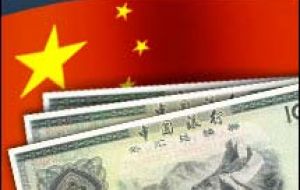MercoPress. South Atlantic News Agency
China supports strong Yuan to curb fuel and food prices
 Yuan rate float with more flexibility
Yuan rate float with more flexibility China's Yuan has soared against the US dollar in its biggest post-revaluation daily rise after the central bank signaled a shift in its policy. The Chinese central bank encouraged the jump by setting a very strong daily reference rate or mid-point of 7.3079.
"The extraordinarily strong mid-points seen this week are a clear signal of faster appreciation of the Yuan in the coming year," said a bank trader. The currency climbed 0.37% after the official China Securities Journal cited Ba Shusong, a cabinet researcher, calling for appreciation to curb prices of imported fuel and food. The Yuan may gain by a "big margin" Yao Jingyuan, chief economist of the National Bureau of Statistics, told a seminar in Beijing. "The economy is overheating in at least some regions", Yu Yongding, the director of the World Economics and Politics Institute in Beijing and a former central bank monetary policy committee member was quoted in an interview. "The central bank now has more room to let the Yuan rate float with more flexibility". The Yuan gained as much as 0.41% to 7.3131 per dollar before trading at 7.3162 as of the Thursday close in Shanghai, according to the China Foreign Exchange Trade System. The average daily fluctuation this week of 0.28% is three times larger than last week's. The currency's 6.7% gain versus the dollar this year is twice as much as last year's 3.3% advance. A 10% appreciation in the Yuan against the dollar would reduce the import prices of oil, soybeans and pork by about 10%, Ba, a deputy director at the State Council Development and Research Center, was cited as saying by the China Securities newspaper. "The Yuan may gain by big margin, which will help lower import costs and curb low-end exports'' the statistical bureau's Yao said. China's central bank in a December 21 statement said it plans "forceful measures" to limit money supply, including a more flexible exchange rate. The market will play a "much" bigger role in setting the Yuan's value, policy makers said after a quarterly monetary policy meeting. But while the Yuan gained against the dollar this year, it fell against 7 of the world's 17 most-active currencies. It slid 3% per Euro, 11% versus the Canadian dollar and 13% against the Brazilian real, pushing up import costs. The central bank this month raised rates for a sixth time this year to rein in credit growth, and lifted the reserve ratio to the highest in at least 20 years. The economy expanded 11.5% in the third quarter and consumer prices rose 6.9% in November from a year-earlier. Forward contracts show traders are betting on an 8.7% advance in the Yuan to 6.7344 per dollar in the next 12 months. China's trade surplus which surged 52% in the 11 months through November to 238.1 billion US dollars has driven foreign exchange reserves to record 1.46 trillion US dollars making it difficult for the government to slow growth and tame asset-price inflation.




Top Comments
Disclaimer & comment rulesCommenting for this story is now closed.
If you have a Facebook account, become a fan and comment on our Facebook Page!